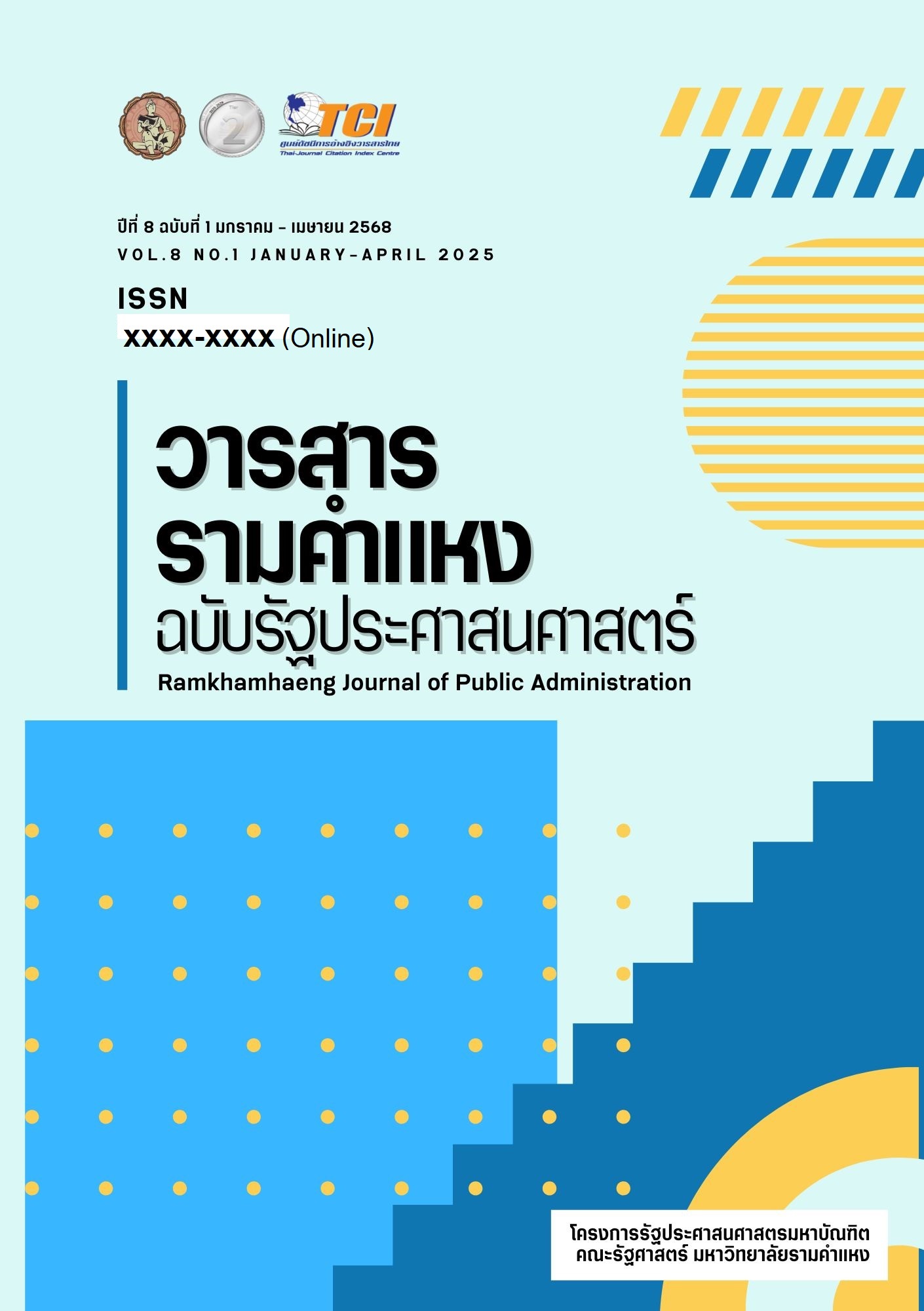การมีส่วนร่วมทางการเมืองของนักศึกษามหาวิทยาลัยราชภัฏสวนสุนันทา วิทยาเขตนครปฐมในการเลือกตั้งสมาชิกสภาผู้แทนราษฎร พ.ศ.2566
คำสำคัญ:
การมีส่วนร่วม ; การเมือง ; การเลือกตั้งบทคัดย่อ
การศึกษาวิจัยเรื่องนี้ มีวัตถุประสงค์เพื่อ 1) ศึกษาการมีส่วนร่วมทางการเมืองของนักศึกษามหาวิทยาลัยราชภัฏสวนสุนันทา วิทยาเขตนครปฐม ในการเลือกตั้งสมาชิกสภาผู้แทนราษฎร พ.ศ. 2566 2) วิเคราะห์ปัจจัยที่มีอิทธิพลต่อการมีส่วนร่วมทางการเมืองของนักศึกษา และ 3) เสนอแนวทางการส่งเสริมการมีส่วนร่วมทางการเมืองของนักศึกษา กลุ่มตัวอย่าง ได้แก่ นักศึกษามหาวิทยาลัยราชภัฏสวนสุนันทา วิทยาเขตนครปฐม ผลการวิจัยพบว่า ผู้ตอบแบบสอบถามส่วนใหญ่เป็นเพศหญิง มีอายุระหว่าง 17-29 ปีกำลังศึกษาชั้นที่ 1 ซึ่งการมีส่วนร่วมทางการเมืองของนักศึกษา ภาพรวมอยู่ในระดับมาก ในด้านอุดมการณ์ทางการเมืองแบบ
ประชาธิปไตย มีอิทธิพลต่อการมีส่วนร่วมทางการเมืองสูงที่สุด พบว่าการกล่อมเกลาทางการเมือง อิทธิพลของครอบครัว การรับรู้ความสำคัญของการเลือกตั้ง มีอิทธิพลต่อการมีส่วนร่วมทางการเมืองของนักศึกษาที่มีนัยสำคัญทางสถิติที่ระดับ .001
เอกสารอ้างอิง
กองบริการการศึกษา มหาวิทยาลัยราชภัฏสวนสุนันทา. (2567). รายงานจำนวนนักศึกษาลงทะเบียนประจำปีการศึกษา 2567. สืบค้นเมื่อ 26 มิถุนายน 2563, จาก https://reg.ssru.ac.th/isqy12
พรรชรนันท์ สายจันดี และคณะ (2565). การรับรู้ทางการเมือง การกล่อมเกลาทางการเมืองและการมีส่วนร่วมทางการเมืองของเยาวชนในประเทศไทย. วารสารพุทธปรัชญาวิวัฒน์, 6(1), 26-40.
สำนักงานคณะกรรมการการเลือกตั้ง.(2562). จำนวนผู้มีสิทธิเลือกตั้งประจำปี 2562. สืบค้นเมื่อ 26 มิถุนายน 2563, จาก www.egt.go.th.
อรณิช รุ่งธิปานนท์. Hot Issue (ธ.ค.2560) [คน รุ่น ใหม่กับการเป็นสมาชิกรัฐสภา]. สืบค้นเมื่อ 26 มิถุนายน 2563, จาก https://dl.parliament.go.th/handle/20.500.13072/521145
Akilarasan.S & Dr. Birendi (2024). Social Media and Young Voters, A Case Study of Punjab. Educational Administration: Theory and Practice, 30(6), 2546-2551.
Aleksandra, Furman., Dagmara, Szczepańska., Dominika, Maison. (2022). The role of family, peers and school in political socialization: Quantitative and qualitative study of Polish young adults’ experiences. Citizenship Teaching and Learning, 17(1), 123-143.
Avril, Keating., Gabriella, Melis. (2017). Social media and youth political engagement: Preaching to the converted or providing a new voice for youth?. The British Journal of Politics and International Relations, 19(4), 877-894.
Ananda, A., & Gistituati, N. (2020, August). Impact of Political Education to the Participation of Beginner Voters in General Election. In International Conference on Social Studies, Globalisation and Technology (ICSSGT 2019) Amsterdam: Atlantis Press.
Casteltrione. (2017). Facebook and political participation: Going beyond over-optimistic predictions. 15(1), 131-148.
Dimitrova, D. V., Shehata, A., Strömbäck, J., & Nord, L. W. (2014). The effects of digital media on political knowledge and participation in election campaigns: Evidence from panel data. Communication research, 41(1), 95-118.
Djumadin, Z. (2021). Student Political Participation and the Future of Democracy in Indonesia. AL-ISHLAH Journal Pendidikan 13(3), 2399-2408.
Flores, K., Dumaguin, C., Dumo, G. G., Fontanilla, A. Z., & Nisperos, K. A. (2022). Social Media as a Transformative Agent of Political Behavior Among Political Science Students in a Component City. American Journal of Multidisciplinary Research and Innovation, 1(2), 78-85.
Grace, U., & Danfulani, J. (2015). Political participation as a catalyst for national development in a democratic society. Research on Humanities and Social Sciences, 5(14), 56-62.
Jinhuang, W., & Zhenzhen, Z. (2022). Analysis on the Micro-environment of Ideological and Political Education in Colleges and universities. International Journal of New Developments in Education 4(6), 44-50.
Kiess, J. (2021). Learning by doing: The impact of experiencing democracy in education on political trust and participation. Politics, (42), 75 - 94.
Liu, H. (2020). Analysis on the Effective Linkage of Ideological and Political Education and Family Education in Universities. Retrieved December 14, 2023, from https://doi.org/10.18686/AHE.V4I8.2566.
Lorenz-Spreen, P., Oswald, L., Lewandowsky, S., & Hertwig, R. (2023). A systematic review of worldwide causal and correlational evidence on digital media and democracy. Nature human behaviour, 7(1), 74-101.
Lee, S., & Xenos, M. (2019). Social distraction? Social media use and political knowledge in two US Presidential elections. Computers in human behavior, 90, 18-25.
Marchand, A., Frisby, M., Kraemer, M., Mathews, C., Diemer, M., & Voight, A. (2021). Sociopolitical Participation Among Marginalized Youth: Do Political Identification and Ideology Matter?. Journal of Youth Development. 16(5), 41-63.
Milbrath. L. W. and Goel.(1977). Political Participation: How and Why Do People Get Involved in Politics. (2nd ed.), Chicago:Rand McNally College Publishing Company.
Rauf, T. (2021). How College Makes Liberals (or Conservatives). SOCIUS, 7. 1-13.
ดาวน์โหลด
เผยแพร่แล้ว
รูปแบบการอ้างอิง
สัญญาอนุญาต
ลิขสิทธิ์ (c) 2025 นฤชา นราผ่อง, ไวพจน์ กุลาชัย

อนุญาตภายใต้เงื่อนไข Creative Commons Attribution-NonCommercial-NoDerivatives 4.0 International License.



